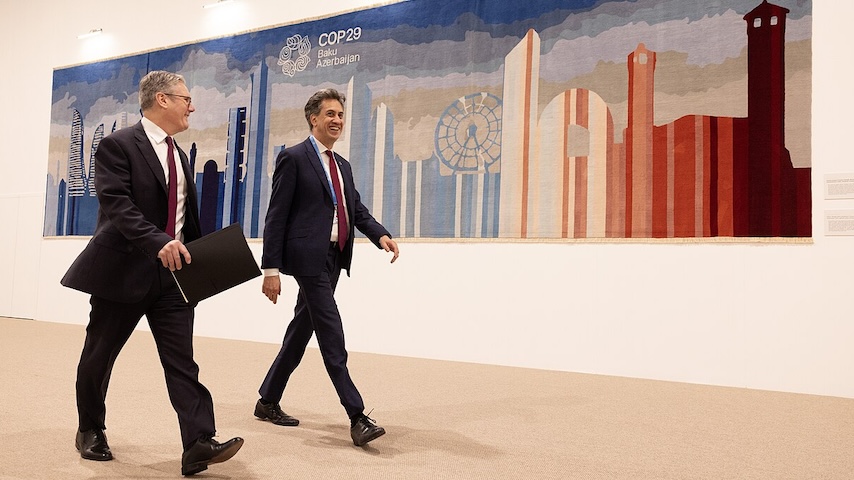‘Fundamental Overhaul’: Leaders and Experts Say U.N. Climate Process is Broken and Needs Repair
Photo by Simon Dawson/No 10 Downing Street/Wikimedia Commons
There is something of a tautology about it: If the international process intended to fix climate change was a good one, it would have fixed climate change. As the world is gathered in Baku, Azerbaijan, for the 29th version of United Nations climate talks, it is tough to argue in its favor: emissions hit a peak this year and will rise again in 2025, and national ambitions and policies still leave the world catastrophically short of the goals laid out in the the process’s signature achievement, the Paris Agreement.
“28 COPs have delivered us with the policy framework to achieve” that goal, specifically keeping warming well below 2.0 degrees Celsius and preferably below 1.5 degrees (which is not happening, alas). “However, its current structure simply cannot deliver the change at exponential speed and scale, which is essential to ensure a safe climate landing for humanity.”
That’s the message from a letter sent to UNFCCC (the U.N. climate change body) leadership this week, calling for a “fundamental overhaul” of the COP process. It is from a collection of world leaders, experts, and others well versed in climate diplomacy — Ban Ki-moon, the former U.N. secretary-general; Mary Robinson, a former president of Ireland; Christiana Figueres, a former executive secretary of the UNFCCC itself; and about two dozen others.
“We need a shift from negotiation to implementation,” the authors of the letter wrote. The surface-level success of last year’s COP28 in Dubai offers a good example: for the first time, the agreement out of the COP included a promise to “transition away” from the use of fossil fuels, an absurdly obvious requirement to solving the problem that somehow took almost three decades to arrive. That breakthrough, though, came with a host of caveats and loopholes, like the inclusion of a line saying “transitional fuels can play a role” in moving away from fossil fuels — that’s just diplomacy-speak for the decades-old delay tactic that fossil gas can act as a “bridge fuel” to a clean energy world.
Falling back on the existing multilateral process, where every word of every document is carefully parsed and re-parsed into, often, essential meaninglessness, is not going to move the world forward. The letter’s authors offer a collection of suggestions for reform, and they start with the elephant in the room: for the love of god stop holding COPs in a petrostate’s living room.
“We need strict eligibility criteria to exclude countries who do not support the phase out/transition away from fossil energy,” they wrote. “Host countries must demonstrate their high level of ambition to uphold the goals of the Paris Agreement.” That probably would take Azerbaijan off the table, a place so reliant on its fossil fuel revenue that its president insists even during the COP on calling its oil and gas a gift of the gods. It would also strike last year’s host, as even though the UAE was a bit better at the PR aspects of hosting it still has plans to massively increase its oil and gas output.
Another suggestion is to, basically, eliminate these big flashy annual meetings. Instead of one two-week COP where the year’s work comes to a head with the negotiations process, there should be “smaller, more frequent, solution-driven meetings” where countries actually report on their progress and work on immediately implementable actions. The authors also recommend better incorporating actual scientific expertise into the UNFCCC — the Intergovernmental Panel on Climate Change’s comprehensive reports are used for scientific backing, but it is not actually part of the multilateral process — and better tracking and accountability when it comes to climate finance, the primary focus of this year’s COP.
It is also time, they wrote, to get the oil lobbyists the hell out of the room. Last year, more than 2,400 industry representatives roamed the halls in Dubai, an incredible example of welcoming the flaming fox into the henhouse. “The fact that there were far more fossil fuel lobbyists than official representatives from scientific institutions, Indigenous communities and vulnerable nations reflects a systemic imbalance in COP representation,” they wrote.
To be clear, the letter does not call for eliminating the COPs entirely, and the authors clearly did not want to undermine this year’s talks as they proceed. “The COP process is an essential and irreplaceable vehicle for supporting the multilateral, multisectoral, systemic change we urgently need,” Figueres later clarified in a statement, according to the BBC. But there’s a very clear sense of spinning our collective wheels here, as year after year the thousands descend on questionably chosen host countries to put down on paper something that does not seem to be happening in the real world. It has been almost thirty years, and [points outside] here we are; time for something to change.